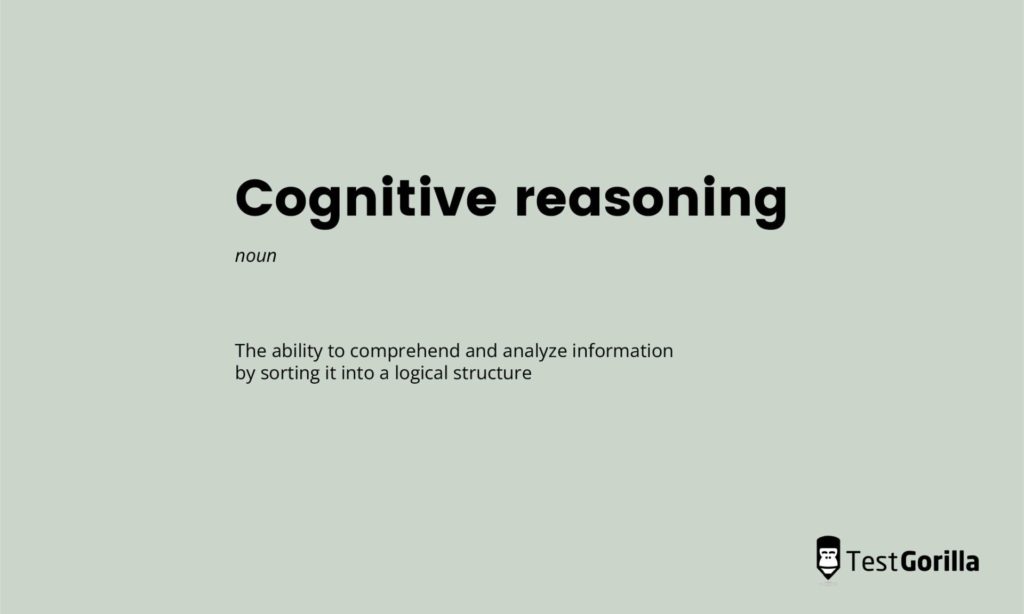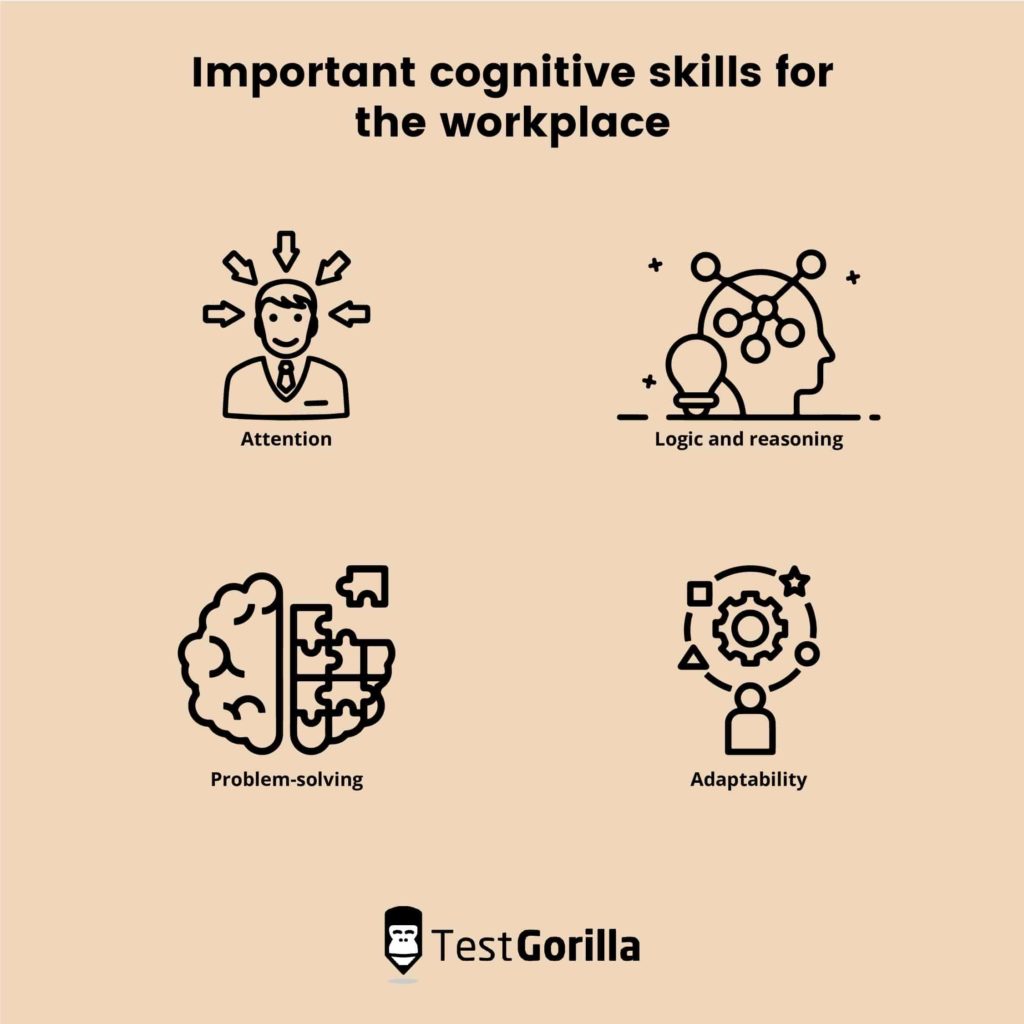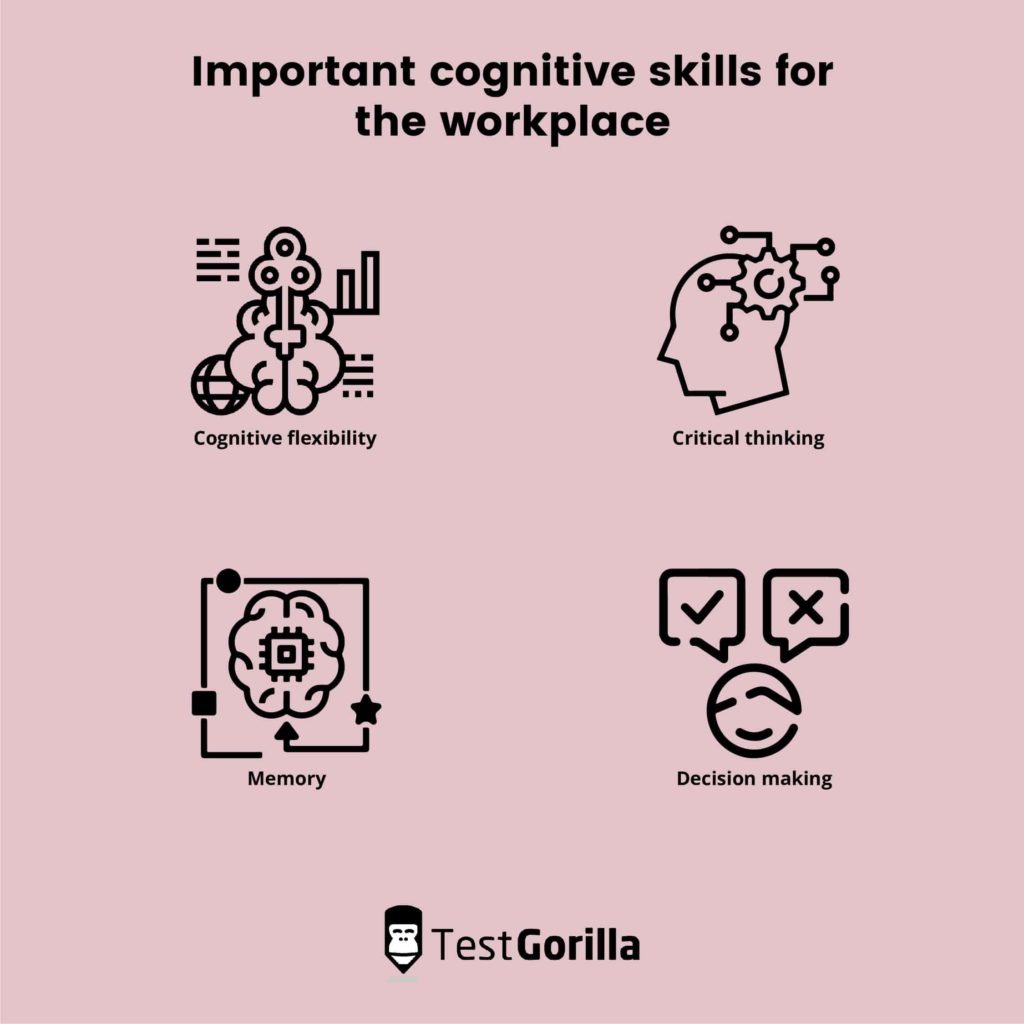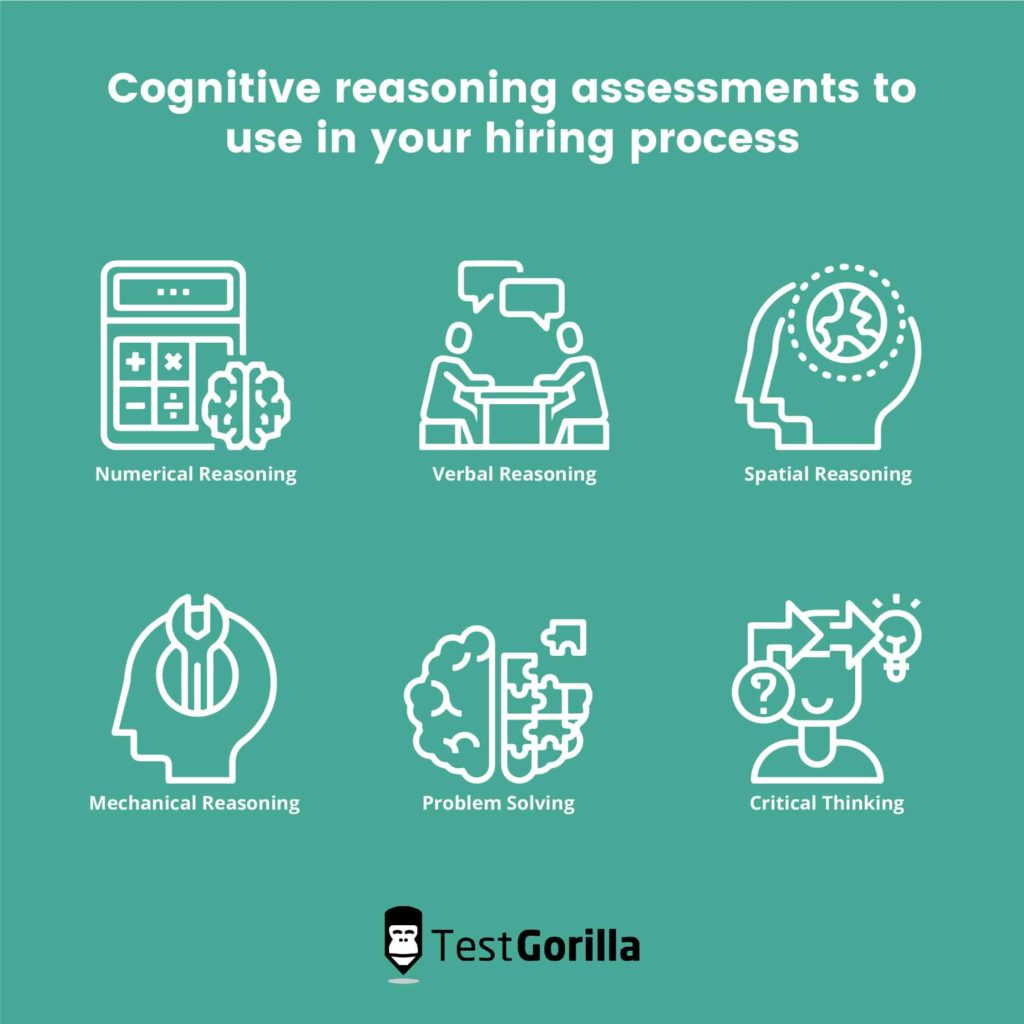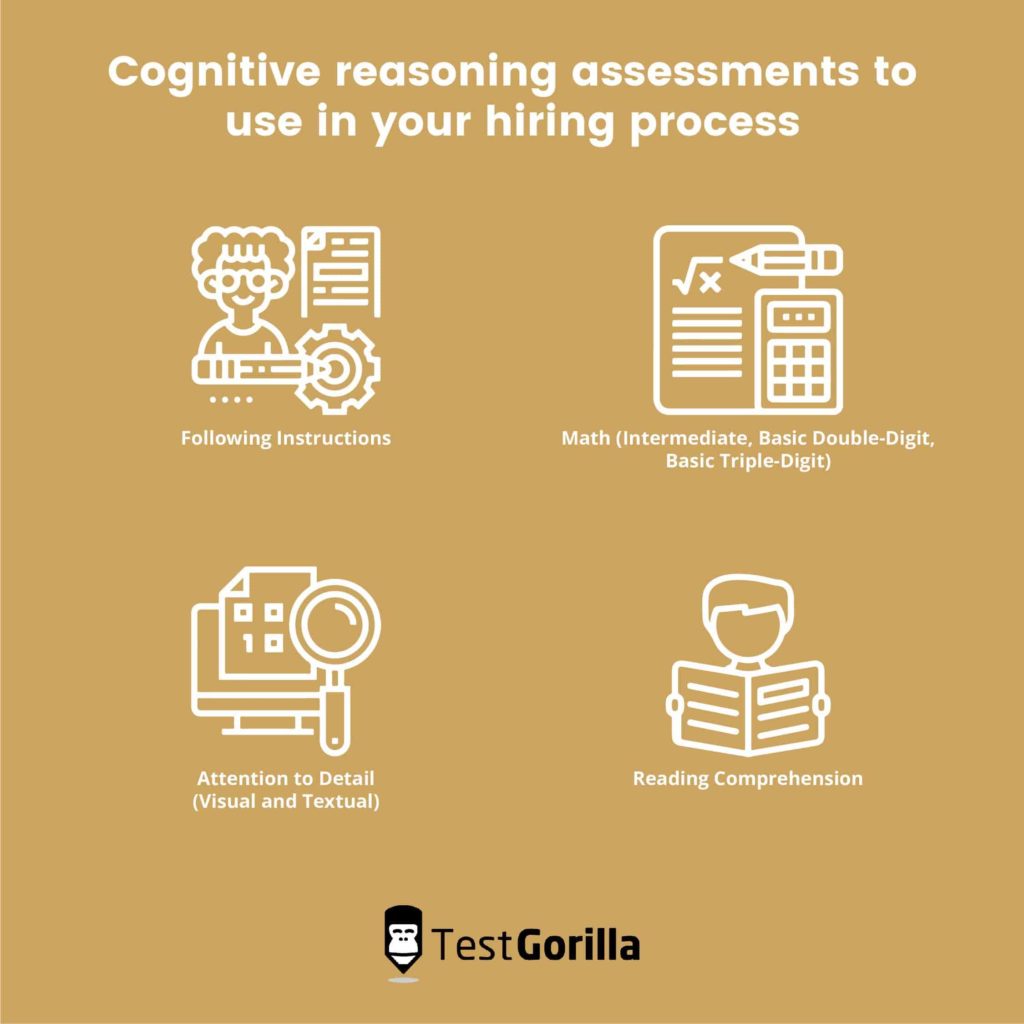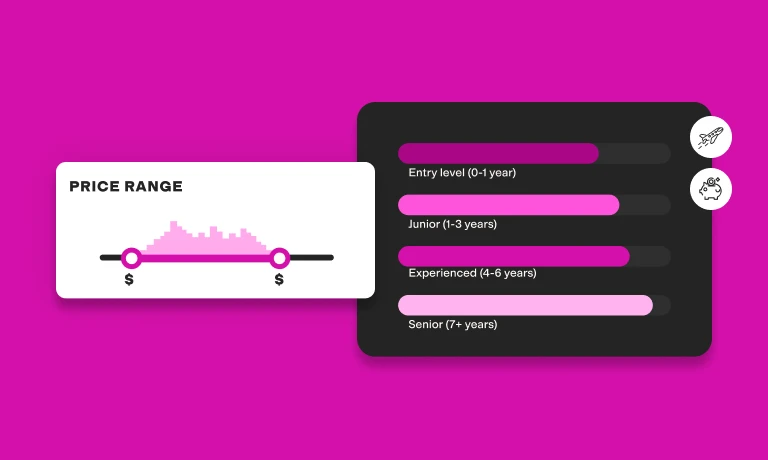Cognitive reasoning: How to find candidates with strong cognitive skills
Every recruiter’s end goal is the same — to improve the quality of work and build strong teams that perform well.
To do that, hiring teams work hard to pick the best candidates.
An efficient way to optimize the hiring process is to look for candidates with strong cognitive skills.
Cognitive reasoning helps an individual analyze any kind of information quickly and clearly. We can easily see why this is crucial in any professional field.
What is cognitive reasoning
Cognitive reasoning refers to the ability to comprehend and analyze information by sorting it into a logical structure. It’s associated with an individual’s ability to interpret information quickly and efficiently, as well as to filter out the parts that don’t matter or slow down the process.
As an integral part of one’s cognitive abilities, cognitive reasoning is a skill that many organizations measure with different tests, puzzles, and assessments.
Tests can help you assess if a candidate can use logic to filter out what’s true or false from the information they’ve been given and if they can solve problems efficiently. They’re easy to conduct and scale and have proven to be one of the most powerful predictors of overall work performance.
Important cognitive skills for the workplace
Nearly every action an individual performs while conscious requires using their cognitive abilities.
The quality of how we learn, remember, plan, solve problems, and pay attention to things depends on how well we have developed our cognitive skills.
Of course, different actions require different cognitive skills.
Here, we’ve compiled a list of cognitive abilities necessary for various jobs in many industries.
Looking for candidates who excel at those skills will certainly optimize your hiring process and increase productivity at your company.
1. Attention
Attention is the cognitive process of filtering details not relevant for a given task while maintaining focus on the aspects of the information that matter.
Research shows that an individual’s overall cognitive performance can be closely related to their ability to control their selective attention and stay on task. In other words, it’s important to test a candidate’s attention when assessing their cognitive skills. But first, we should learn more about the different types of attention as a cognitive function:
Sustained attention
This refers to the ability to sustain attention over prolonged periods in specific goal-oriented behaviors. Or, to put it another way, your ability to maintain sustained attention shows how well you can stay focused on a particular task without your actions losing efficiency.
Many companies realize the value of staying focused at the workplace, and they look for ways to control distractions. This is good practice and provides increased productivity, especially when combined with psychometric assessments of cognitive skills.
Alternating attention
This is the ability to shift your attentional focus rapidly and to multitask. The ability to reorient your attention at will is valuable for jobs that require juggling more than one task simultaneously (and let’s face it, that’s a must for nearly all jobs).
Alternating attention is usually tested through multiple-choice tasks or multiple-object tracking tests.
Attention to detail
Attention to detail skill is connected to thoroughness and accuracy. It refers to the ability to examine all elements of the task at hand, regardless of how minor they might appear. There are two main types of attention to detail – visual and textual.
Visual attention to detail refers to your ability to analyze and manage visual information thoroughly, while textual attention to detail is connected to maintaining awareness of all aspects of a text and working with them efficiently.
Regardless of the type, attention to detail is a cognitive skill that plays a big part in most professional fields. Being thorough always adds to the quality of work, which is why it’s good to implement assessment tools for attention to detail and to keep track of your candidate’s behavioral indicators and proficiency levels.
2. Logic and reasoning
The ability to use logic is crucial for any industry and job position, from entry-level to senior leadership.
Applying information-based logic to assess the situation rationally and decide on a course of action is known as reasoning. If you don’t develop your reasoning skills, you won’t make effective choices. Otherwise said, this cognitive skill allows you to weigh the advantages and disadvantages of any decision before you take it.
Without strong logic and reasoning, you can’t effectively solve problems, verify claims or handle uncertainty at the workplace.
There are different types of reasoning, each of them beneficial in its own way:
Deductive reasoning
Deductive reasoning uses logic and observations to prove whether an assumption is right or wrong. This type of reasoning is frequently associated with mathematical and philosophical logic. A simple example would be, “All men are mortal. Bill is a man. Therefore, he is mortal.” The results from deductive reasoning usually have logical certainty.
Abductive reasoning
Abductive reasoning, also known as inference to the best explanation, is especially useful for situations in which you don’t have much knowledge about a problem, but you still have to make a decision quickly.
A simple example would be, “A patient complains of having difficulty breathing when exercising. A common symptom of asthma is having difficulty breathing when exercising. Therefore, the doctor suspects that the patient might have asthma and runs further tests to find out if his hypothesis is correct.”
Abductive reasoning is useful when forming a hypothesis that requires further testing to prove. It’s an especially desirable ability for detectives, researchers, diagnosticians, and people who work with troubleshooting.
Inductive reasoning
Inductive reasoning refers to the ability to generalize based on empirical evidence and to use logic to support various observations and theories. It’s similar to abductive reasoning, and while it’s a particularly persuasive method, the results are not necessarily certain. A simple example would be, “I took out an object from the bag and it was a ball. I took out a second object and it was a ball. The third object was also a ball. Therefore, all objects in the bag are balls.” That cognitive skill is particularly useful for professions that deal with extrapolation and prediction.
3. Problem solving
Problem solving is something everyone does on a daily basis. It’s needed even in the most mundane situations: for example, an employee goes to the office supply store only to find out it’s closed.
How do they deal with that problem? They need to consider all variables and plan a strategy. Is there another store nearby? Is it likely to be open? Will it have the item they need? Can they find out before they go there? And so on.
Employees have to solve problems while working with far more complicated matters. Many people might depend on the way they solve problems: their teammates, supervisors, and clients.
They have a specific time frame in which they need to deal with the issue. If they don’t solve the problem, other people’s working processes will be affected, which in turn will affect the company’s overall productivity and efficiency. That’s why strong problem-solving skills are crucial for any business!
Implementing pre-assessment tests for problem solving and establishing a strong problem-solving culture at the workplace are some of the steps you can take to ensure your company’s success.
4. Adaptability
Adaptability refers to the ability to adopt new skills and behaviors in response to rapidly changing circumstances.
People with strong adaptive skills have a huge potential for growth and can take an effective course of action even when things don’t go according to plan. That’s an ability that can be of great use in any working environment, which is probably why nearly half of C-suite leaders see adaptability as crucial for their success in the future.
Flexibility is among the top ten skills employers look for in potential employees because the economic environment is constantly changing, and people who don’t always need a map to handle their work efficiently perform better.
Adaptability is critical for leadership roles. The higher up the ladder you are, the more you need to consider a wide variety of variables and complexities when you conduct an effective business strategy, and the more you need to find a way to adapt your course of action.
Adaptability is also connected to the ability to let go of skills you have developed for previous working roles that you no longer need.
Adaptability is strongly linked to the ability to learn: 87% of workers believe it will be crucial for them to develop new working skills so they can keep up with the rapid changes in the workplace.
5. Cognitive flexibility
The World Economic Forum declared cognitive flexibility to be one of the top skills needed to succeed in a working environment.
But what is cognitive flexibility?
There are many vague definitions of the term. Some claim it’s the ability to switch between different cognitive skills. Others say that it’s the capacity to radically change your perspective or approach.
One of the more nuanced definitions comes from Professor Rand Spiro, the creator of the Cognitive Flexibility Theory. He states that it’s the ability to spontaneously restructure your knowledge in response to radically changing environments or demands.
One of the biggest advantages of strong cognitive flexibility is heightened creativity: the ability to come up with fresh ideas, link them together, and innovate. Contrary to popular belief, creativity is a powerful driving force in scientific and technical fields, too. You can’t advance technologically without innovations!
Cognitive flexibility also helps you recognize potential faults in your approach, which protects you from a number of harmful biases that sabotage your success. This skill is also related to higher resilience to negative events.
6. Critical thinking
Critical thinking refers to the ability to analyze facts to produce an informed judgment.
Essentially, it’s a challenging and questioning approach towards knowledge. Goal-oriented critical thinking helps you understand any situation better and achieve your objectives with better accuracy and effectiveness.
A 2018 study declares that strong critical thinking predicts task performance above and beyond general intelligence. Some of the main elements that make critical thinking useful are the ability to:
Identify assumptions and therefore discover information gaps
Implement logical and causal reasoning in tasks
Evaluate hypotheses
7. Memory
Thanks to memory as a cognitive skill, we can encode, store and reuse the information and skills we’ve developed.
There are essentially three types of memory: long-term, short-term, and working (operative) memory. Let’s look at them in a professional context.
Long-term memory
Long-term memory allows us to build a foundation of vital information that’s necessary in order to perform well. Often, the conscious mind is not aware of the information we store long-term, but we implement it daily in our lives.
Short-term memory
Short-term memory, or “active memory,” refers to our ability to manipulate and store a small amount of information for short periods of time. It helps us achieve goals without stressing and overloading our minds with knowledge that won’t be useful outside of the context of the situation we’re dealing with at that moment.
Working memory
Working memory, or “operative memory,” is a type of short-term memory that is more attention-demanding and doesn’t turn into a routine. It lets us store and manipulate information temporarily and carry out complex cognitive tasks. Strong working memory is a cognitive skill used in the majority of our daily activities. That’s why evaluating it accurately is important for the quality of your hiring process.
Decision making
The higher the job position, the more decision making it involves. This is something that effective executives know: to make good decisions you need to establish a systematic process with clear elements and a distinct set of steps that you have to take.
This is what the decision-making cognitive skill is all about: being able to identify and execute the best course of action. Selecting quickly between two or more alternatives to reach the best outcome is an ability that always comes in handy at work.
Making effective decisions is a crucial part of tasks such as developing successful plans, mastering time management, prioritizing tasks, increasing employee engagement, and maintaining a solid working environment.
The best insights on HR and recruitment, delivered to your inbox.
Biweekly updates. No spam. Unsubscribe any time.
Cognitive reasoning assessments to use in your hiring process
Employers are willing to pay premium salaries to candidates with greater cognitive abilities because such skills enable better learning in changing environments and reduce susceptibility to behavioral biases.
Cognitive reasoning is crucial for making the right choices at the workplace, and making the right choices is what brings your company success. Implementing tests for cognitive skills during the hiring process will help you hire smarter and better.
Here is a list of pre-employment cognitive ability tests that can be useful for your business:
1. Numerical Reasoning test
Testing the candidates’ general aptitude with numbers is useful for a wide variety of job positions, especially roles in finance and accounting. You can use the Numerical Reasoning test to figure out if your applicants are proficient at interpreting numbers, fractions, percentages, tables, charts, and diagrams.
2. Verbal Reasoning test
This test fits any role that requires good use of language and reasoning. With it, you can assess your applicants’ verbal reasoning skills and their ability to recognize logical relationships between words and draw accurate conclusions from written text.
3. Spatial Reasoning test
Spatial reasoning refers to one’s ability to analyze 2- and 3- dimensional objects in space. That’s a crucial skill for mechanical and chemical engineers, researchers, architects, and most STEM-related positions.
4. Mechanical Reasoning test
Using a Mechanical Reasoning test in your hiring process can help you evaluate the candidate’s level of understanding of basic mechanical and physical concepts. This is particularly useful if you’re hiring technicians, electricians, plumbers, machine operators, or technical salespersons, among others.
5. Problem Solving test
Can someone use their analytical skills to evaluate the problem at hand accurately and to respond to it correctly, even under pressure? Roles that require an employee to manage constantly shifting variables that need to be dealt with in a short period of time demand problem-solving skills.
6. Critical Thinking test
If you’re hiring analysts, computer and data scientists, people for legal and executive roles, or any other job positions that require solving complex problems through independent thinking, using a pre-employment test for critical thinking will be highly beneficial.
7. Reading Comprehension test
Reading comprehension is about more than just the ability to read text: it has to do with a person’s capacity to comprehend what’s written and draw the correct conclusions through analysis. Testing this skill is advised for any role that involves processing and evaluating written information, but it’s especially useful for remote teams that communicate mainly through text.
8. Following Instructions test
Testing your candidates’ ability to understand instructions is especially useful for entry- to mid-level positions and will allow you to assess their level of understanding instructions in different contexts and forms.
9. Intermediate Math test
If you’re looking for candidates that work well with numbers, the Intermediate Math test will be of great help for you during the hiring process. It allows you to identify candidates who have a strong ability to solve math equations and problems that involve fractions, ratios, percentages, decimals, and time estimates.
Basic Double-Digit Math test
The Basic Double-digit Math test is about basic math skills, such as addition, subtraction, multiplication, and division of single- and double-digit numbers. It can be used to evaluate the ability to make elementary-level calculations and solve simple equations.
Basic Triple-Digit Math test
Cashiers, hospitality workers, manufacturing workers, industrial workers, and many others need to be able to solve basic math equations with triple-digit numbers.
10. Attention to Detail (visual) test
There are a large number of roles that require good attention to visual details: graphic designers, marketing designers, in-house designers, lab technicians, and many others. With this pre-employment test, you can identify the candidates who pay close attention to visual cues and handle visual details with thoroughness and focus.
Attention to Detail (textual) test
Our Attention to Detail (textual) test will help you evaluate applicants’ ability to pay attention to details in a text and thoroughly analyze written information. It’s also particularly helpful for entry-level jobs that require a strong overall focus.
Hire candidates with excellent cognitive reasoning skills
Cognitive reasoning tests are the best way to predict a candidate’s overall job performance. If you’re not already using pre-employment tests, now is the time to start.
TestGorilla allows you to identify the best candidates for your company through a variety of short, effective, and professional tests. Get started by requesting a demo now.
FAQs
What’s the difference between fluid reasoning and cognitive reasoning?
Cognitive reasoning includes all mental processes like memory, problem-solving, and decision-making. Fluid reasoning is a specific subset of cognitive reasoning that focuses on solving new problems and thinking logically without reliance on past knowledge.
You've scrolled this far
Why not try TestGorilla for free, and see what happens when you put skills first.


